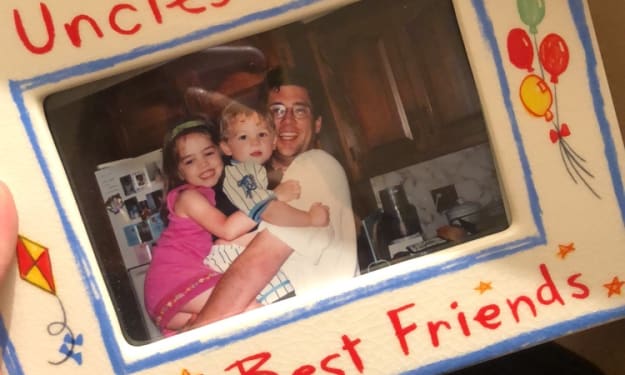
The loss of a parent is a tragic event at any stage of life, but has significant impacts on those who experience such a loss during their childhood or adolescence. As grief and death are complex emotions and experiences to go through, such experiences have lasting effects on those who are exposed to them at a young age. Properly grieving and processing a loss requires a level of emotional intelligence most people do not have until their late adolescent years. Even so, the loss of a parent, or experience of bereavement, leaves children and adolescents in a vulnerable position in their education, mental and physical health, and their interpersonal relationships.
In a study conducted by Eur Child Adolesc Psychiatry, family bereavement puts an adolescent at risk of internalizing problems within two years of the experiences loss and mental health problems by the young age of nineteen, compared to their peers who did not experience a similar loss. However, the study also shows that certain pre- existing situations, such as coming from a low socioeconomic status or family health conditions as additional factors affecting the mental health of an adolescent pre- bereavement. Family functioning holds great significance as a source for one’s mental health condition. The loss of a parent is likely to have an impact on how the family functions, needing to learn and relearn a new way of life that keeps proper function of the family and household despite grieving a tremendous loss. Family bereavement experiences between the ages of birth and nineteen often cause the adolescent or child who is grieving to externalize their problems, possibly showing more signs of struggle of greif than those who are older.
This study also documents that participants who went through family bereavement at a younger age were feeling a sense of high maturity levels as a result of their loss (Eur Child Adolesc Psychiatry, 2016). An article published by Psychology Today titled When a Child Loses a Parent, author Romeo Vitelli Ph.D. discusses how the loss of a parent early in life can later on affect one’s relationships. As Vitelli mentions, relationships between a child and their parents has a great affect on the child’s ability to form interpersonal relationships. He also refers to the attachment theory, which states that young children need a form of strong attachment to a caregiver who provides them with support and unconditional love, helping them develop skills needed in relationships as they age. Overall, a healthy relationship with at least one caregiver aides in healthy development of their personalities and their ability to one day have intimate relationships with others (Vitelli, 2018).
Attachment theory suggests that when a child deals with prolonged grief after the loss of a parent are vulnerable to developing long-term emotional issues due to failure of resolving their sense of loss. These children are prone to experiencing symptoms of depression and anxiety, while experiencing other issues should their grief cause them to feel withdrawn or isolated. Non- bereaved children are less likely to experience difficulty in their education and have a higher academic performance overall. Vitelli references a study conducted by Beverly Lim Hoeg and a team of Danish researchers which gave the results of a comprehensive study on people who had lost a parent prior to turning eighteen years of age. The study examined information on their relationship status, educational background, relationship issues they’ve experienced and a fourteen-year period of medical history. Data was collected from participants both bereaved and non- bereaved. Those who were bereaved prior to their eighteenth birthday were at a much higher risk of marital separations and were more likely to enter common-law relationships rather than traditional marriages. However, the study also concludes that how the surviving parent manages and goes through the process of attachment reorganization, may be less likely to face problems later in life as a result of bereavement (Vitelli, 2018).
A book titled Bereavement: Reactions, Consequences, and Care, an entire chapter is dedicated to discussing how bereavement during childhood and adolescence plays a factor in one’s mental and physical health and interpersonal relationships later in life. As grief is a complex emotional experience, many children can only endure short spurts of strong emotions, leading to the avoidance of feelings to prevent an overwhelming sense of emotions. This delayed working through of bereavement can require specialized assistance if avoidance seems to have effected or blocked psychopathologic symptoms being to surface. Death is a complex concept for children to grasp, which plays a role in how they mourn or struggle to do so. Psychoanalysts believe that children cannot have the capacity to tolerate the painful affects necessary to complete the process of separation after death and that both children and adolescents are likely to use immature defense mechanisms, including denial.
The death of a parent at a young age has been linked to a range of serious, enduring health consequences which can be as severe as schizophrenia to major depression. As an immediate reaction to bereavement, children and adolescents are likely to experience grief similarly to adults; they most likely have a range of emotional and behavioral reactions as they process a new loss. Struggles in school, sleeping, or being withdrawn from daily activities are likely to occur to those grieving. In the long run, investigators found that there may be a link between loss experiences and subsequent precipitation of specific diseases such as rheumatoid arthritis and diabetes. Most commonly found in children and adolescents who suffered bereavement are neurosis and depression. Early bereavement greatly increases a child’s susceptibility to depression, delinquency and school dysfunction. As research suggests, depending on the immaturity of the child or adolescents personality, even a minor duration of depression can interfere with normal ego development and in turn disrupt or distort psychological growth (M. Osterweis, F. Solomon, M. Green, 1984).
While a child or adolescent can navigate the loss of a parent in a way which allows them to develop without psychological or emotional disturbances is possible with a strong support system and attachment reassignment, it is likely that they will become vulnerable to an array of negative effects over their life course. Their education, mental health, emotional health and interpersonal relationships are all likely to suffer as a result of bereavement. Receiving proper care and support at the time of loss and throughout their development is crucial for healthy recovery from such a significant loss. As a social worker who may be working with a client who suffered bereavement at a young age much value the importance of human relationships and seek resources that enable the other adults in their lives to be a “vehicle for change,” and ensure the youth is well supported in their grief. As it is state in the Code of Ethics, social workers seek to strengthen relationships in a purposeful effort to promote, restore, maintain and enhance the well-being of an individual or community (NASW Code of Ethics, 2019). It is imperative a social worker be able to create a sense of community of support to the youth suffering from their loss so they can grieve constructively and continue to grow without adversity.
If you have suffered the loss of a parent, please reference some resources below.
or griefspeaks.com
Resources will also be shared
About the Creator
Anne
blogger, content creator and mama
find me on socials: @paranneting @anamesa_anne
zillenial






Comments
There are no comments for this story
Be the first to respond and start the conversation.